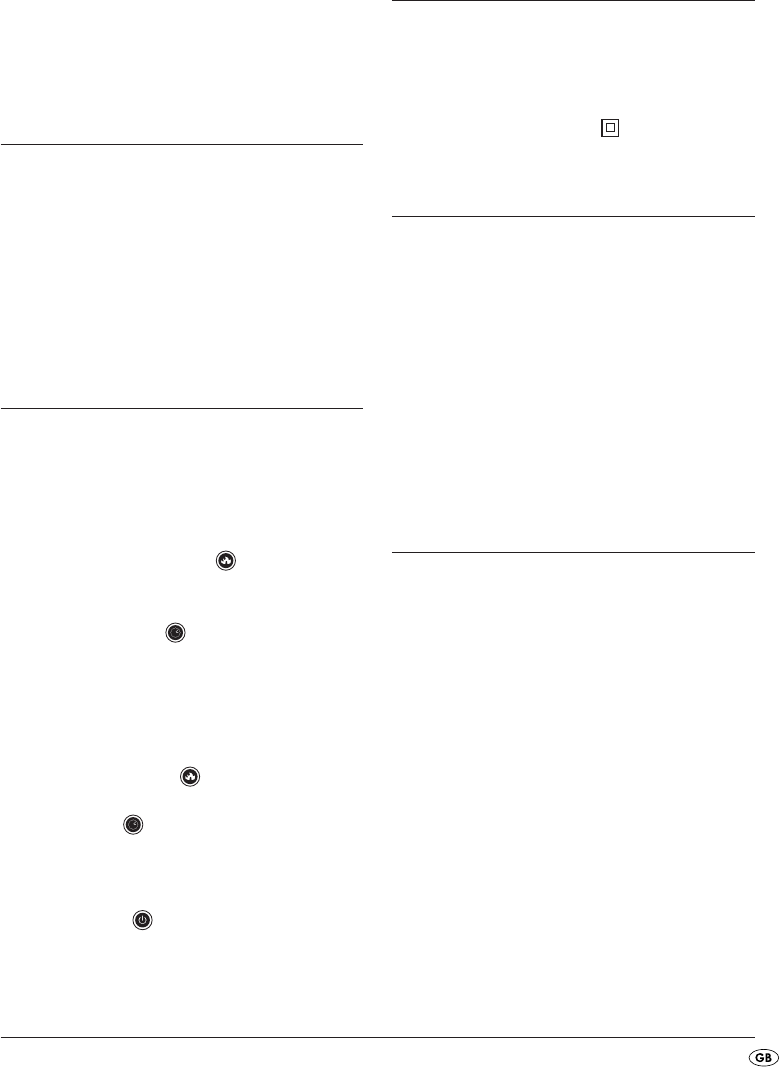
- 3 -
• Medical-technical devices such as heart pace-
makers, hearing aids and other appliances may
possibly need to be kept at a greater distance.
If in doubt, ask the manufacturer of the device!
Intended use
This appliance is ...
• intended for the heating up or keeping warm of
foods in domestic households and ONLY for use
in dry accommodation.
• NOT intended for the warming or heating up
of other materials, for industrial or commercial
applications or for use outdoors.
Appliance Overview
1 Hob
2 Display
Details of power level, timer settings or heat indi-
cator ("L" = Low – Temperature <50°C or "H" =
High temperature >50°C)
3 Control Lamp Power Stage
By glowing, it shows that the power stage is
being shown in the display.
4 Control Lamp Timer
By glowing, it shows that the timer is being
shown in the display .
5 ▼ ▲
Raise or reduce the setting for the power level or
the elapsed time (Timer)
6 Button - Power Setting
For setting the power level (L1-L10)
7 Button - Timer
For setting elapsed times of up to 180 mins for
automatic switch off
8 Control lamp
9 On/Off button
Switch the hob on or off, cancel the function
0 Power cable with power plug
Technical data
Voltage : 220-240V
~
50/60Hz
Power consumption : 1800 - 2000 W
The workplace related noise emission of this
appliance is lower than 70 dB(A)
Protection class: II
Manner of operation
Whilst standard hobs become warm themselves, in
an induction cooker the heat is created in the base
of the cookware. The hob 1 itself is not heated up -
at the most, it becomes warmed up by the hot cook-
ware standing on it (reverse heating).
For this, an energy field generates a heat which can
only be created in magnetically conductible materials,
for example, pans made of iron. In other materials,
for example porcelain, glass or ceramic, the energy
field cannot create any heating effect.
Suitable cookware
Use only cookware that is suitable for induction
cookers:
• Suitable are pots and pans with a base made of
steel or cast iron. These are recognisable either
through the markings on the pan or if a magnet
clings to the base of the pan.
• Unsuitable are all types of cookware made of
metals to which a magnet does not cling, for
example aluminium, copper and stainless steel,
as well as those made of porcelain, glass, ceramics
and plastics etc.
• Thin pan bottoms are better suited for induction
cookers than thick sandwich bottoms. The very
short reaction times to setting adjustments (short
pre-warm time; fast metered roasting) are not
possible with thick pan bases.
IB_54336_SIKP2000A1_LB6 23.06.2010 14:09 Uhr Seite 3










